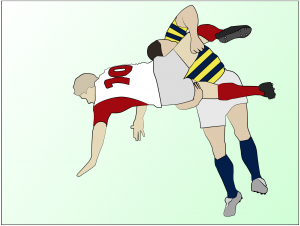Sports have always been of immense fascination to us, particularly games which result in either a winner or a loser.
The instinctual attraction to “getting the best” of another human is inherently primal: in olden days, it meant clubbing one’s opponent over the head on the battlefield or goring him through the stomach in the Coliseum.
Perhaps that’s why we humans are so attracted to winning. Triumph used to mean felling any immediate danger and rejoicing in the jubilance of being granted another day to live. Such jubilance still exists alongside winning. Some call it “the thrill of victory.”

However, if there’s anything ABC’s Wide World of Sports taught us back in the late ‘70s, it’s that the thrill of victory is always countered by the agony of defeat. Whether that agony references the painful blow of an opposing goal scored, or the slow twisting of a sword into the lower intestines, none can be certain.
Rest assured, however, if there’s one thing instinct has inculcated within us, it’s fight with all you’ve got or come to a terrible demise, even if that means the utter humiliation of another human being.
On Saturday, Jan. 26, the University of California at Berkeley’s men’s rugby squad bested long-time rival Stanford by a significant margin of 176-0, a score which, at best, could be called a painful defeat.
Cal’s dominance on the pitch is nothing new. The rugby powerhouse has put up 100-plus points in 10 different matches over the past five years, won a total of 26 collegiate championships in the last 30, and was ranked the number one best men’s college team in 2011. Cal has also won all 17 of its last 17 games against Stanford. Needless to say, the odds were primarily in their favor.
Still, such a plenteous defeat is humiliating. For those not familiar with the rules of rugby, the 176 points scored by Cal are roughly equivalent to 28 touchdowns in American football, a sufficient shellacking in any level of the sport.
Men and women who engage in as violent a sport as rugby are bound to let their primal instincts get the best of them eventually, especially in this weaker vs. stronger, alpha vs. beta scenario. In the case of Cal vs. Stanford, what could have been a simple victory on Cal’s part resulted in a record-setting blowout – one that will most likely stick with players from either squad for the rest of their lives.
What remains prevalent is that, despite the initial odds, Cal could have scored even one-tenth the points and achieved the same effect. A win, after all, is a win. It’s also rather unlikely that Cal had anything to prove to a team they’d knocked off 17 times in a row. So why, then, were the 176 points necessary?
Back in 2009, a Texas high school girls’ basketball team made national headlines by defeating a rival team 100-0. The coach, who was subsequently fired, was quoted at saying he would not apologize “for a wide-margin victory when my girls played with honor and integrity.”
Such an attitude of merciless dominance isn’t exactly healthy to have around high school-aged teens. Sure, the girls’ “can-do” spirit was admirable and inspiring, but scoring such an outrageous amount of points essentially rubs salt in the already-raw wound of a loss.
In the already stressful, self-conscious world of high school, the last thing any teenager needs is a heavy dose of humiliation and degradation, especially if it comes from the one thing most kids see as an escape from everyday life. Sports aren’t meant to harm youth – their sole purpose is to allow kids to exert themselves in healthy, positive ways, while at the same time teaching them what it’s like to be part of something bigger.
Cal’s dominant win over Stanford is hardly justifiable by any standards, much less an example of pristine sportsmanship. True, it feels great to achieve a victory after a hard day’s work, but is the cost of a win truly worth twisting the knife further? Is a 176 point lead any better than, say, a 21 point one?
The cost of a tremendous win such as Cal’s is far greater than the immediate feeling of jubilation. One can only hope that, as the season progresses, Cal’s squad is able to keep its brutish, primal instincts in check, and allow a positive sentiment both on and off the field.
So next time it looks like a blowout, ease up a little. While the complete dominance of the other team may seem important at the time, the detrimental effect on the opposing players isn’t worth the score, and a little bit of mercy can go a long way. After all, at the end of the day, it’s just a game.
Alex Herz is the Opinion Editor for the Redwood Bark






